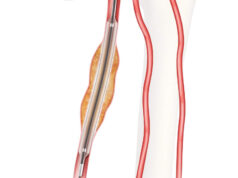
Guerbet has announced that the Thailand FDA has given approval of a new indication for Lipiodol Ultra-Fluide for selective hepatic intra-arterial injection for visualisation, localisation and vectorisation during transarterial chemoembolization of tumours in adults with known, intermediate stage hepatocellular carcinoma.
Hepatocellular carcinoma is the most common primary cancer and is the second biggest cause of death due to cancer worldwide.
“Guerbet is proud to be granted approval for this new indication for Lipiodol Ultra-Fluide, this reflects a strong positive endorsement from Thailand liver cancer doctors,” commented Eam-Maly Nam, Guerbet ASEAN Distribution Manager. “The development of these image-guided procedures is a top priority for Guerbet’s Interventional Radiology and Theranostic Business Unit as we work to enhance liver cancer patients’ prognosis and quality of life in Thailand and worldwide.”
Lipiodol Ultra-Fluide is used for conventional transarterial chemoembolization (cTACE), a minimally invasive procedure which consists of mixing Lipiodol Ultra-Fluide with an anticancer drug. The mixture is injected transarterially in the liver as a locoregional targeted chemotherapy for unresectable hepatocellular carcinoma tumours. Lipiodol Ultra- Fluide acts as a contrast agent, a drug-eluting vehicle, and a dual arterioportal transient embolic.
This indication was recently approved in Japan, France, Austria, The Netherland, South Korea, Turkey, Czech Republic, Hungary, Peru, Mongolia, Argentina and Vietnam. It has been submitted to many other European and Asian countries and other registrations are still pending. These steps follow approval of the indication by the US Food and Drug Administration (FDA) in April 2014 for “selective hepatic intra-arterial use for imaging tumours in adults with known HCC “.
Guerbet Lipiodol Ultra Fluide is used in conventional cTACE procedures for the treatment of patients with inoperable liver tumours. cTACE has been published in over 100 clinical studies, of which five were international randomised controlled trials, out of a total number of more than 10,000 patients with intermediate stage hepatocellular carcinoma who have been reported on in the peer-reviewed scientific literature.
cTACE has been established as the gold-standard for the treatment of patients with intermediate stage hepatocellular carcinoma by several international clinical consensus guidelines in Japan, Europe and the United States. These consensus guidelines unanimously recommend cTACE as the standard-of-care for patients with intermediate stage hepatocellular carcinoma. These recommendations were made with a Level of Evidence 1iiA and a Grade of Recommendation 1A in the European guidelines.
These guidelines stipulate that these patients present a median survival of 16 months only whereas cTACE extends the survival of these patients to a median of 20 months, ie four additional months. Additionally, the shortest survival reported is 14 months for the worst case scenario of untreated candidates whereas the longest survival reported is 45 months for the best responders to cTACE, i.e. a 31 month differential, according to a press release from Guerbet.
Consequently, the release adds, treatment with cTACE is constantly increasing in all continents, with more than 500,000 patients being treated every year.










